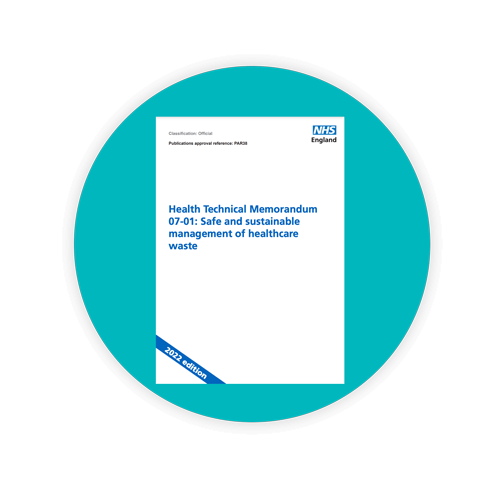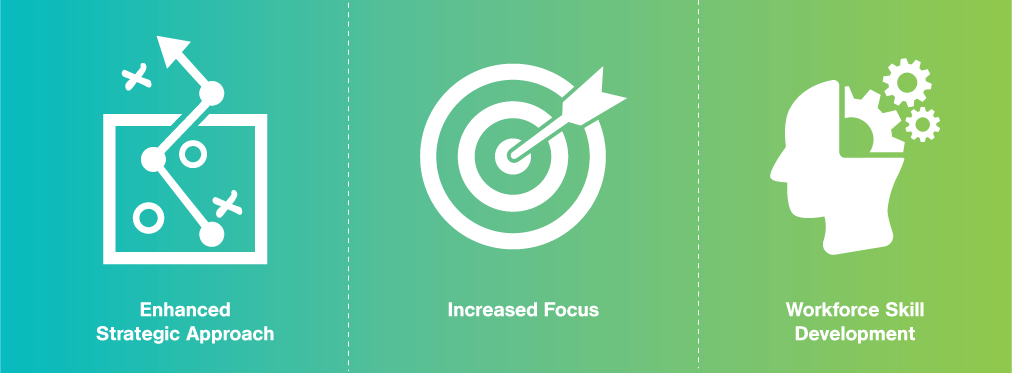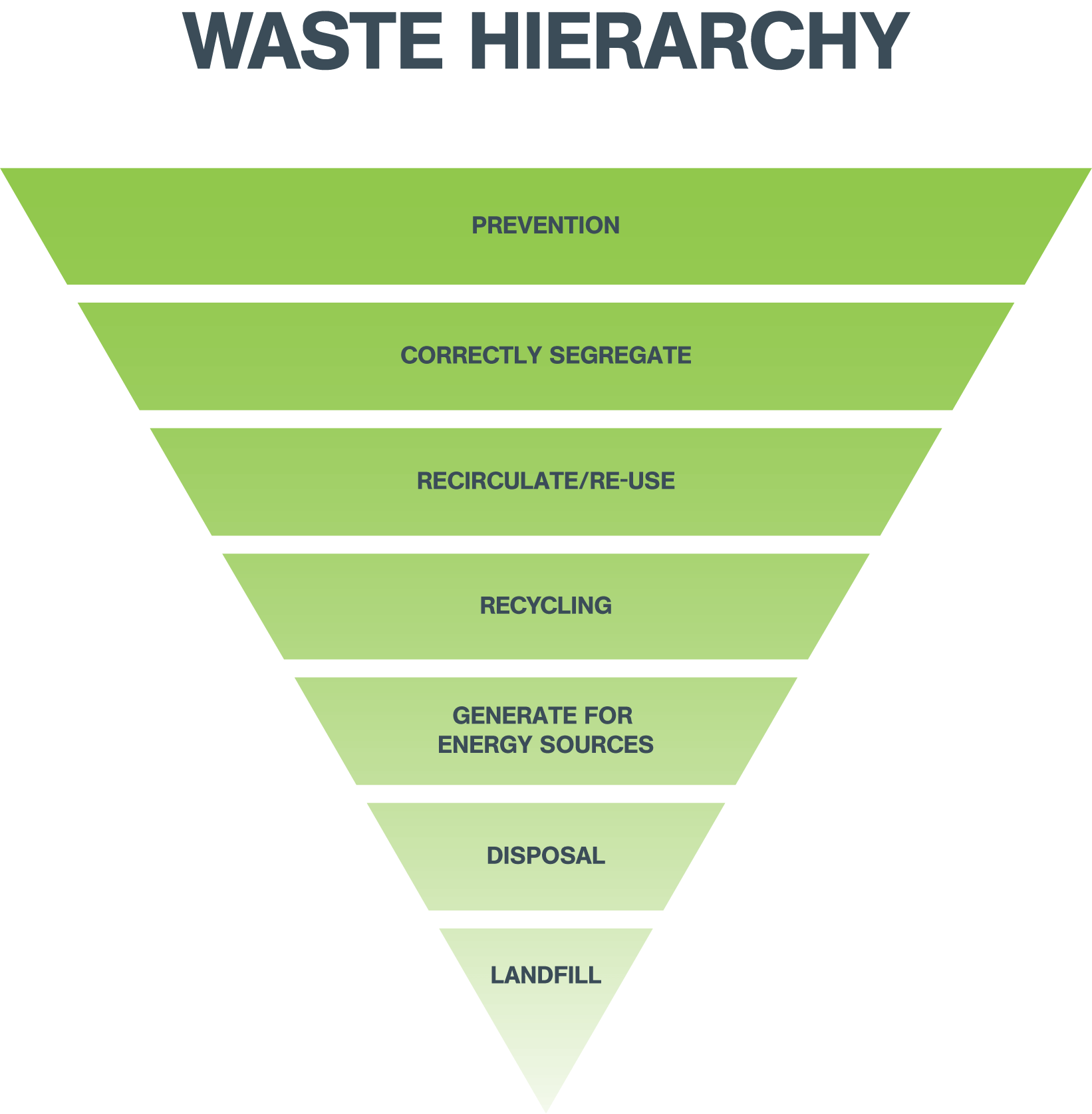HTM 07-01: A Summary of the Key Changes

The refreshed HTM 07-01 is the first major update to this health technical memorandum in 10 years – this updated version puts an added emphasis on sustainability with a strategic alignment for managing waste. In this blog, we’ll look at a summary of the key changes to the HTM 07-01 and how they improve the guidance and help with the safe and sustainable management of healthcare waste.
TOPICS WE WILL COVER:
1 / What is the Health Technical Memorandum (HTM) 07-01?
2 / Why has the HTM 07-01 been updated?
4 / Do these changes improve the guidance?
5 / Do you need help implementing the new guidance?
What is the Health Technical Memorandum (HTM) 07-01?
The Health Technical Memorandum (HTM) 07-01 is a document that provides comprehensive guidance for the safe and sustainable management of healthcare waste and details the environmental benefits of doing so. The main purpose of this technical guidance is to equip healthcare workers with the knowledge and understanding needed to play their part in contributing to a safer, more environmentally-friendly healthcare system. It also highlights opportunities for cost savings, presents safer working practices, and outlines methods for reducing waste-related carbon emissions.
Why Has the HTM 07-01 Been Updated?
A lot can change in 10 years, and it has. Since the 2013 edition of this document was published, there have been legislative and regulatory updates, and the introduction of new best practice standards – affecting the delivery of healthcare waste services. Sustainability has become a priority for businesses across the UK, and the NHS is no exception.
The updated guidance aligns with the NHS Clinical Waste Strategy and the targets set out to achieve Net Zero. It also highlights circular economy concepts and methods for minimising environmental burden and enhancing social benefits.
What Are the Key Changes?

This lengthy blog could become quite cumbersome if we listed every single change, so rather than run through an exhaustive list we’ll summarise the key differences and some related areas within each one:
- An enhanced strategic approach to waste management.
- An increased focus on sustainable waste management.
- An improved workforce skill development within waste management.
Enhanced Strategic Approach to Waste Management
An enhanced strategic approach to waste management will enable the elimination of unnecessary waste and support the prevention of incorrect classification and bad segregation practices.
The Clinical Waste Strategy
This new strategy will transform the way NHS providers handle healthcare waste and enable them to make the necessary changes to existing processes. It will enable the elimination of avoidable waste and improvements to classification and segregation practices – avoiding costly and carbon-intensive overtreatment. This strategy does more than define the steps to a more sustainable healthcare system, it also outlines a definitive set of measures of success and targets to achieve over the next 10 years.
Sustainable Procurement
The NHS Clinical Waste Strategy highlighted the crucial role procurement plays in waste reduction because it can help to implement the first stage of the waste hierarchy – prevention. Sustainable procurement is the procurement and purchasing of products and materials that deliver both environmental and social value. Following the “5 Rs for sustainable procurement”, there’s a renewed focus on reducing product demand and consumption whilst identifying opportunities for reuse, redistribution, or refurbishment. Another important aspect will be ensuring environmental benefits such as waste prevention and reduced packaging are delivered through contractual measures with suppliers. Sustainable procurement should take into account the full life-cycle impact of a product – even when looking to replace single-use products with reusable ones.
Increased Focus on Sustainable Waste Management
An increased focus on sustainable waste management will advance the circular economy and significantly reduce carbon emissions and environmental burden, whilst also enhancing resource efficiency.
Advancing the Circular Economy
The circular economy is a system built on the reuse and regeneration of materials or products to enable continual operation in a sustainable or environmentally friendly way. It’s based on three principles:
- Regenerate natural systems.
- Design out waste and pollution.
- Keep products and materials in use.
Circular economy principles can be applied to great effect in many areas of healthcare waste management – reducing consumables such as single-use plastics and prioritising reusable equipment wherever possible. Switching to reusable products also reduces transport road miles and the associated carbon emissions, pushing waste up the hierarchy into more environmentally favourable positions.
An Updated Waste Hierarchy
This refreshed waste hierarchy that’s more specific to healthcare waste serves as a framework for sustainable waste management that includes being more efficient with resources and eliminating avoidable waste where possible. It also equips NHS providers with the framework to manage waste in the most environmentally favourable way possible whenever it’s generated. Compliance with the waste hierarchy will also make it easier to follow the steps to minimise overall product use and reduce both packaging and reliance on single-use plastics
Improved Workforce Skill Development within Waste Management
An improved workforce skill development within waste management will cultivate in-house expertise and enable staff to make better decisions and streamline workflows to drive efficiencies.
New Waste Management Resources
To aid the process of introducing dedicated Waste Managers within every Trust, new waste management resources have been added to the guidance that includes a list of key measures for the controls, precautions and responsibilities of the Waste Manager role. The healthcare waste policy is another helpful resource – all Trusts should have a waste policy in place that defines the site-specific approach to managing waste from point of production through to disposal. The waste policy for each organisation should also include any site-specific guidance and training material in harmony with the updated HTM 07-01 – regardless of whether those services are delivered through a third-party contractor or in-house.
Principles of Effective Contract Management
Because NHS providers rely heavily on third-party contractors, they need to ensure quality and regulatory compliance when procuring, mobilising, and monitoring waste contracts. Collaboration between Procurement teams and Waste Managers and an understanding of contractual mechanisms are crucial to effectively plan for new service contracts and ensure requirements are met throughout the contract’s life.
Do These Changes Improve the Guidance?
The 2023 update to the Health Technical Memorandum 07-01 brings many improvements to the previous version and enables all those working within the industry to contribute to building a safer and more sustainable healthcare system.
Some of the main improvements include:
- Updates to the technical guidance, best practices, and compliance requirements that align with the latest strategies, legislation, regulations, and technical tools.
- A more organised approach to integrating new opportunities within the system, including innovative waste management solutions.
- An optimised approach to sector-specific guidance making it clear, concise, and easy to follow by eliminating unnecessary repetition and redundancy.
Do You Need Help Implementing the New Guidance?
We’re here to help! At Sharpsmart, we’re used to breaking down technical guidance into digestible pieces and helping healthcare teams gain a better understanding of compliance and best practices. We’re much more than a waste management service and our work doesn’t end at the loading dock – our expert waste consultants work with your teams inside the four walls of your organisation. Please don’t hesitate to get in touch.
Let's Talk!
Your time is valuable, and we don’t want to play hard to get. You can either phone us directly on the details listed on our contact page, or feel free to fill out this short form and one of our team members will get back to you as quickly as possible.
